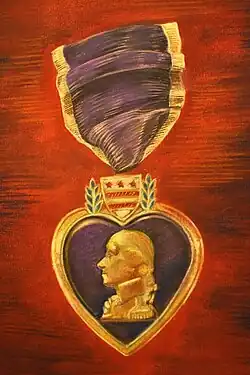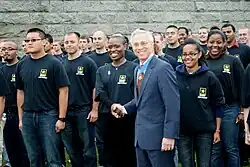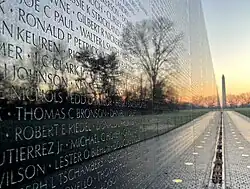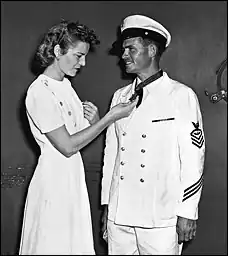Jack H. Jacobs
_(cropped).jpg)
Colonel Jack Howard Jacobs (born August 2, 1945) is a retired colonel in the United States Army and a Medal of Honor recipient for his actions during the Vietnam War. He serves as a military analyst for NBC News and MSNBC and previously worked as an investment manager.
Quotes


.jpg)

And of course, ten years later, that's exactly what we did. Fifty-eight thousand lives later.

Beyond Glory (2003) interview
- Note: Edited interview transcript featured in Beyond Glory: Medal of Honor Heroes in their Own Words (2003) by Larry Smith, New York: W.W. Norton & Company, hardcover, pages 234-252.
- If you have to defend liberty, you've got to defend liberty. It's as simple as that. But I found the actual combat a horrible, horrible thing, to be acutely avoided. Whatever you can do, it's best to avoid it... I was scared all the time I was in Vietnam. I didn't enjoy it for a second.
- p. 234
- The South Vietnamese were never highly thought of but one thing in retrospect that is of interest to me is the perception now that a lot of soldiers are only as good or as bad as their leadership, and they were taught a lot of bad lessons. For example, go out, contact the enemy, drop a lot of bombs on them, and then go in there. But that doesn't work in that environment. What you're supposed to do tactically is use all your indirect fire, bring it all to bear and move while all this fire is going in there. But we didn't do that. We tried to bomb the shit out of them, and then move on.
- p. 236-237
- Young people don't have enough peripheral vision, they can't see very far into the future. Toward the end of my college career, the war was starting to heat up and a lot of people were against it already, but I figured they probably didn't know what they were talking about. There were no big protests at Rutgers, but the tenor of the intellectual discourse was decidedly against American participation in the war. Later on, I had a fairly grown-up view of what the war was really like and that the chances of getting your head blown off as an adviser were just as good as anywhere else: It's all a matter of luck, most times, anyway, all things being equal. So it's irrelevant whether you're standing in a bar that gets mortared or lying in the middle of a rice paddy getting shot at.
- p. 237
- I remember George Aiken, this senator from Vermont, got up in the Senate- and this was long before we made that huge commitment of forces in Vietnam, still relatively early in the conflict- and Aiken was a Republican who was pretty much to the right, he said, 'I've got a great idea: Why don't we just say we won, and go home?'
And of course, ten years later, that's exactly what we did. Fifty-eight thousand lives later. And now we know from the tapes that came out from Johnson, he said, 'This sucks. This is a big mistake. I'm going to live to regret this. I know we're doing the wrong thing, but what can you do?' He was very badly advised. He had rotten advice from his civilian assistants, and even worse advice from the military. McNamara was probably the wrong guy in that job, and Westmoreland was a complete numbskull. I mean, he's a great guy and I'm sure he's a patriot, but one should never confuse respect for people's motives with respect for their intellectual acuity, and he had lots of the former and none of the latter, none whatsoever. He was absolutely the wrong guy for the job.
And it may very well be that you couldn't have picked the right guy for that job. There may not have been a right guy for that job.- p. 237-238
- You don't think you're going to get shot. And, as a matter of fact, even when you get shot, you think it's a big mistake. Your first reaction- it's a bit like getting cancer or something, there's all this denial, you say, well, this is not really happening. This actually is not supposed to happen to me. It's supposed to happen to that guy over there. Then, of course, you realize that it is happening to you and it isn't a movie and you're not watching somebody else. If you had a high degree of confidence you were going to get killed, nobody would ever go to defend this country. I think one of the things that motivates you to do so is not only your inherent patriotism and your desire to do the right thing, but also at least the hope that it ain't going to happen to you. Otherwise, you just wouldn't do it. Only a maniac would do it, and most people aren't maniacs. So I think you start with a high degree of confidence that it's not going to happen to you. There was another old saw back then that said: 'If you go into the Army, you're either going to go to Vietnam or not; if you're not going to get sent to Vietnam, you don't have to worry; if you go to Vietnam, you're either going to get wounded, or not; if you're not going to get wounded, there's nothing to worry about; if you are wounded, you're either going to die, or you're not going to die. Well, if you are not going to die, you have nothing to worry about; and if you are going to die, you can't worry... so don't worry.'
- p. 238-239
- Sure the Vietnamese were reluctant, they didn't want to fight. They were true believers, but they were reluctant participants. The kids were all conscripts, and they were going to get their brains blown out. They weren't interested in fighting. And this is to say nothing of all the strategic errors we had made when Ho Chi Minh asked for help. I mean we advised them during World War II and they asked us to help them throw the French out and, because we were afraid of pissing off de Gaulle- who, by the way, needed a great deal of pissing off, if you want my opinion- we decided we weren't going to do anything about it. We would have solved a lot of problems if we'd just told de Gaulle to get the hell out, if we'd helped Ho Chi Minh and got rid of those guys and been done with it.
But we couldn't distinguish between Ho being a Nationalist on the one hand and his being a communist on the other, any more than today we can distinguish between Osama bin Laden's beig a Muslim on the one hand, which by the way is completely trivial, and a revolutionary on the other, which is really what he is. Ho Chi Minh really was a Nationalist, a revolutionary. So they say Osama bin Laden is a fascist.- p. 242-243
- It happens, stuff like that happens, and you do what you have to do and you don't think about it. People who do these sorts of things are not tactical geniuses. You follow your heart, you follow your training, and you do what you can do, and often guys don't make it. And there are lots of guys who did similar things and never got cited. There's lots of actions that have taken place where guys have done extraordinary things, where ordinary people have done extraordinary things that never got to the level of being published.
That's the way combat is. That's ordinary people doing extraordinary things. There are lots of instances in which people have done really quite extraordinary things, and I don't know if they got anything or not.- p. 249
- It has made me more aware of a number of things. First of all, how important each person's contribution is to society and his fellow man. It's something you know about, but you don't think about it. I mean, I certainly didn't think about it until after this action, and now it's something I think about all the time. Also, there is the perception that I am representative of other people. I'm also representative of an ideal, and it's very important that I continue to be true to that ideal. I have to assume everybody is looking at me, even though they're not. I have to be true to myself and true to what I think are ideal principles.
- p. 252
- It's sort of like the guy said, Justice Potter Stewart, when presented with the opportunity to rule on whether something was obscene or not, he said, I don't have to tell you what it is; I'll know it when I see it. And I think it's a lot like that in combat. If you were to ask somebody before he went in, 'Are you going to be able to acquit yourself honorably?' he'll say, 'Yes'- without knowing what that circumstance will be.
- p. 252
If Not Now, When? (2008)
- Note: If Not Now, When? Duty and Sacrifice in America's Time of Need. Co-written with Douglas Century. New York, Berkley Caliber, hardcover.
- When you have nearly completed the ROTC program and are approaching graduation and commissioning, you request a specific branch assignment. There are many occupational specialties whose smooth integration into the whole of the Army produces the well-oiled military machine we know well. Soldiers and contractors have to get paid, so there is a Finance Corps. The Army is a large bureaucracy, and there is plenty of paperwork to do, and so some officers join the Adjutant General's Corps. The Army can't fight without supplies, and so the Quartermaster Corps is critical to combat success. Indeed, among many of my brethren in ROTC, the large majority of them selected noncombat branches, almost certainly because for some of them these administrative specialties afforded far less chance of becoming a casualty. Let's face it: some people talk a convincing game, but they shrink at the point of decision, when, in the harsh glare of sunlight, the consequences of their selected course of action appear overloaded with personal danger. This does not make them bad people, but it is instructive of the axiom that you should believe half of what you read and none of what you hear.
- p. 53-54
- When I was decorated in 1969, there were 450 living recipients of the Medal of Honor. Today, there are only about one hundred, and the average age is near eighty. Statistically, in five years there will only be fifty or sixty still alive, and in less than fifteen years there will be none of us left. There has not been a living Medal of Honor recipient from any conflict since the war in Vietnam.
- p. 271
- Perhaps now resigned to the verity that time waits for no one, recipients get together as often as possible, but forty years ago, when men now long gone were still young and were going to live forever, we gathered only every other year. At the first Medal of Honor Society dinner I attended, my tablemates included Charles "Commando" Kelly, the first recipient in Europe in World War II; the flamboyant Marine aviator Pappy Boyington; and the World War I ace Eddie Rickenbacker, who sat to my immediate right. I was twenty-six and passing dinner rolls to a man who had piloted a biplane in dogfights against the Kaiser's "Flying Circus," before my father was born. And it is even more astonishing that also in attendance was Bill Seach, who was born in England in 1877 and had recieved the Medal of Honor for, among other exploits, leading a bayonet charge during the Boxer Rebellion in China in 1900. These men, proud representatives of both their nation and the valor of their fallen comrades, are all gone now.
- p. 271-272
- Today, the oldest living recipient of the Medal of Honor is John Finn, who was decorated for action on Pearl Harbor Day. Born in 1909, John joined the Navy in 1926, and, loquacious as we all tend to be when we findally grasp that we have too many stories and not enough time, he will transfix anyone who cares to listen with tales of what it was like to grow up before the First World War and to ply the Yangtze River as a young sailor aboard an American gunboat.
In 1941, he was stationed in Kaneohe Bay, with a squadron of Navy patrol planes. Rudely rousted from bed by the cacaphony of the Japanese bombs destroying the fleet anchored at Pearl Harbor, John raced from his quarters, sped to the hangars that housed his aircraft, and manned a .50-caliber machine gun mounted on an exposed section of a parking ramp. For the next two hours, Finn, in the open and suffering from more than twenty shrapnel wounds in his back and stomach, blasted at the attacking enemy planes, hitting many of them and not relinquishing his post until the attack was over. Even when we were young, those of us who were raised on stirring John Wayne war movies assumed there was more than a little hyperbole and cinematic license in them. But for forty years I have known a man whose real-life exploits render the movies limp, pallid, and ineffectual in contrast. Art can often approximate life, but it has a hard time doing it justice.- p. 272
- Not long ago, I asked John what he was doing at the precise moment when the Japanese attacked Pearl Harbor. "Truth be told, my boy," John said, "I was in bed with a good-looking gal." I asked if he ever saw her again. "See her again?" said John. "She was my wife for sixty years!" Then he slapped his knee and bellowed with laughter.
- p. 272
- Recipients of the Medal of Honor really have little in common. They have been from every state, economic station, and ethnic group. But they have shared a strong sense of duty and of purpose and the motivating burden of personal responsibility at the perilous moment of decision. They feared death, but their biggest fear was failing themselves, their friends, and their nation, and thus they have been no different from the tens of millions of the other men and women who have served in uniform.
When the Japanese attacked on December 7, 1941, most Americans did not know where Hawaii was, let alone Pearl Harbor. And yet on the very next day, thousands of Americans rallied to the nation by offering their services in its defense. During World War II, almost every household made some contribution to the effort, and nearly half a million Americans sacrificed their lives so that hundreds of millions of others could live.- p. 273
- Today, a small number of brave and dedicated young Americans have answered the call, and whatever else one can argue about the merits of recent uses of military power, it is impossible not to revere the patriotism of these volunteers. More Americans were killed in New York on September 11, 2001, than were lost on December 7, 1941, and yet the response was a small fraction of that after Pearl Harbor. What is interesting, and more than a little distressing, is that the number of people wearing the uniform is only a bit more than 1.5 million on active duty, and that this represents only one-half of one percent of Americans.
One may reasonably inquire why, if the war in Iraq is so unpopular, there aren't riots in the streets as there were during the war in Vietnam. One answer is that our service members are all volunteers, and no one else has to serve. This country has been going about its business almost as if nothing catastrophic has occurred, while the sacrifice has come from only a few citizens. Those of us who don't serve have thus outsourced our defense to those who do. One could argue persuasively that if all citizens had a stake in the protection of our freedom, the arbitrary use of the military instrument of power, as a first resort, would be very difficult to engineer.- p. 273-274
- If you have been getting something for nothing for a long time, it's tough to convince you to pay for it. But pay Americans must. In the years since the end of World War II, we have experimented with a number of schemes for producing the force we have needed, but none has been based on the notion of shared sacrifice. It is arguable whether the current volunteer system or one in which we relied on a draft is worse, but suffice it to say that they are both bad. We don't need selective service. We need universal service. But there is great political danger in merely suggesting that all Americans contribute in a meaningful way to our collective defense, and so no politician who wants to keep his job will do it. Consequently none does, and we are the poorer for it.
A society coheres only when it shares beliefs and experiences, and humans rarely value things that are acquired at no cost. With a miniscule percentage of people making a contribution to our defense, we will not be successful in protecting a country of more than three hundred million people, worldwide obligations, and threats from a variety of malefactors who want to see us destroyed.- p. 274
- Some of us are fortunate to spend time with the few who have served and bear the scars to prove it. Yes, visiting badly wounded troops makes you self-conscious, uncomfortable, frustrated, angry, and guilty. But it also generates pride that our society can produce such magnificent young people. They have an unquenchable optimism, a certainty that they will overcome the rotten luck and physical constraints, and a conviction that they will prevail. With the same dedication they displayed in volunteering to be our proxies, and in taking care of each other on the battlefield, these splendid citizens take pride in working hard every single day to accomplish simple things that the majority of us take for granted. The United States of America would be a much better place if we would emulate them.
- p. 274-275
Quotes about Jacobs
- For conspicuous gallantry and intrepidity in action at the risk of his life above and beyond the call of duty. Capt. Jacobs (then 1st Lt.), Infantry, distinguished himself while serving as assistant battalion adviser, 2d Battalion, 16th Infantry, 9th Infantry Division, Army of the Republic of Vietnam. The 2d Battalion was advancing to contact when it came under intense heavy machine-gun and mortar fire from a Viet Cong battalion positioned in well-fortified bunkers. As the 2d Battalion deployed into attack formation, its advance was halted by devastating fire. Capt. Jacobs, with the command element of the lead company, called for and directed air strikes on the enemy positions to facilitate a renewed attack. Due to the intensity of the enemy fire and heavy casualties to the command group, including the company commander, the attack stopped and the friendly troops became disorganized. Although wounded by mortar fragments, Capt. Jacobs assumed command of the allied company, ordered a withdrawal from the exposed position, and established a defensive perimeter. Despite profuse bleeding from head wounds which impaired his vision, Capt. Jacobs, with complete disregard for his safety, returned under intense fire to evacuate a seriously wounded adviser to the safety of a wooded area where he administered lifesaving first aid. He then returned through heavy automatic-weapons fire to evacuate the wounded company commander. Capt. Jacobs made repeated trips across the fire-swept, open rice paddies, evacuating wounded and their weapons. On three separate occasions, Capt. Jacobs contacted and drove off Viet Cong squads who were searching for allied wounded and weapons, single-handedly killing three and wounding several others. His gallant actions and extraordinary heroism saved the lives of one U.S. adviser and 13 allied soldiers. Through his effort the allied company was restored to an effective fighting unit and prevented defeat of the friendly forces by a strong and determined enemy. Capt. Jacobs, by his gallantry and bravery in action in the highest traditions of the military service, has reflected great credit upon himself, his unit, and the U.S. Army.
- Citation for the Medal of Honor awarded to Jacobs, presented on 9 October 1969 by President Richard Nixon at the White House, Washington, D.C.[1]